人教版九年级全册Unit 2 I think that mooncakes are delicious! Section A 课件(共29张PPT)
文档属性
| 名称 | 人教版九年级全册Unit 2 I think that mooncakes are delicious! Section A 课件(共29张PPT) | 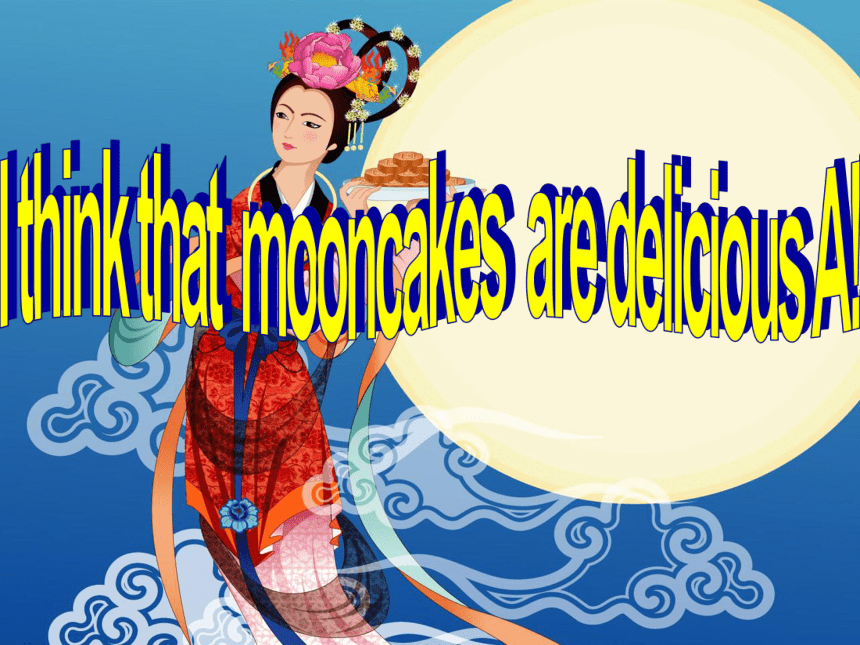 | |
| 格式 | zip | ||
| 文件大小 | 4.4MB | ||
| 资源类型 | 教案 | ||
| 版本资源 | 人教新目标(Go for it)版 | ||
| 科目 | 英语 | ||
| 更新时间 | 2023-01-28 20:48:17 | ||
图片预览

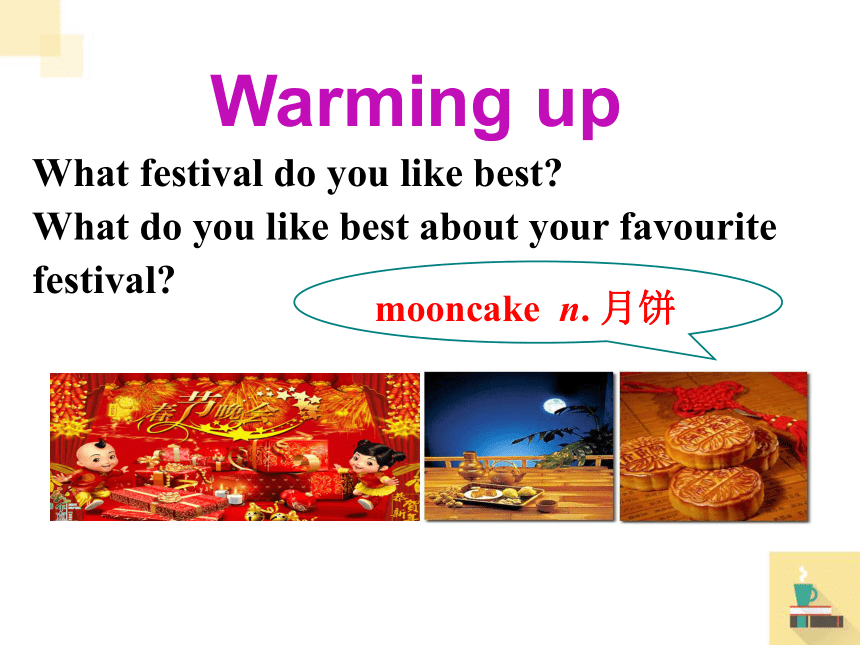
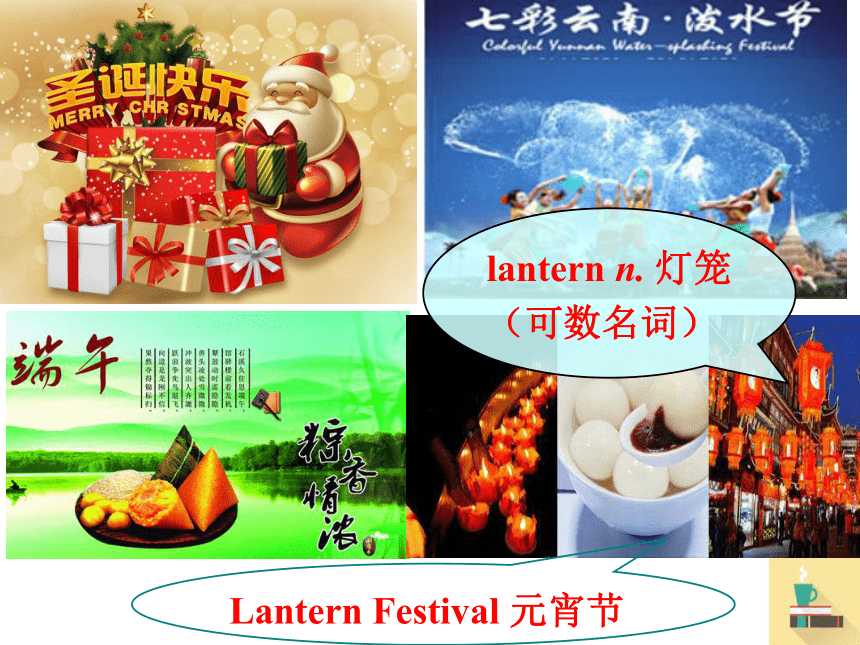
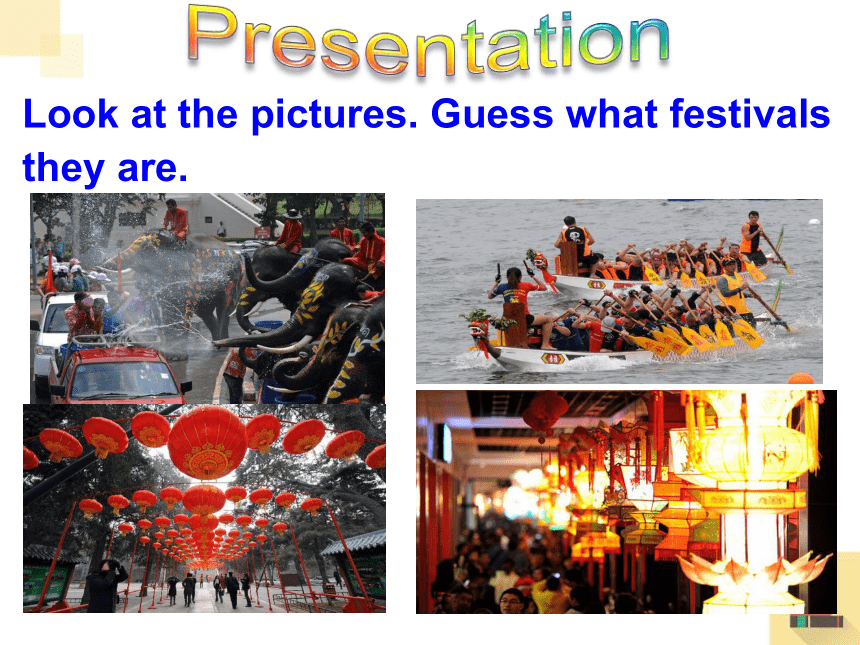
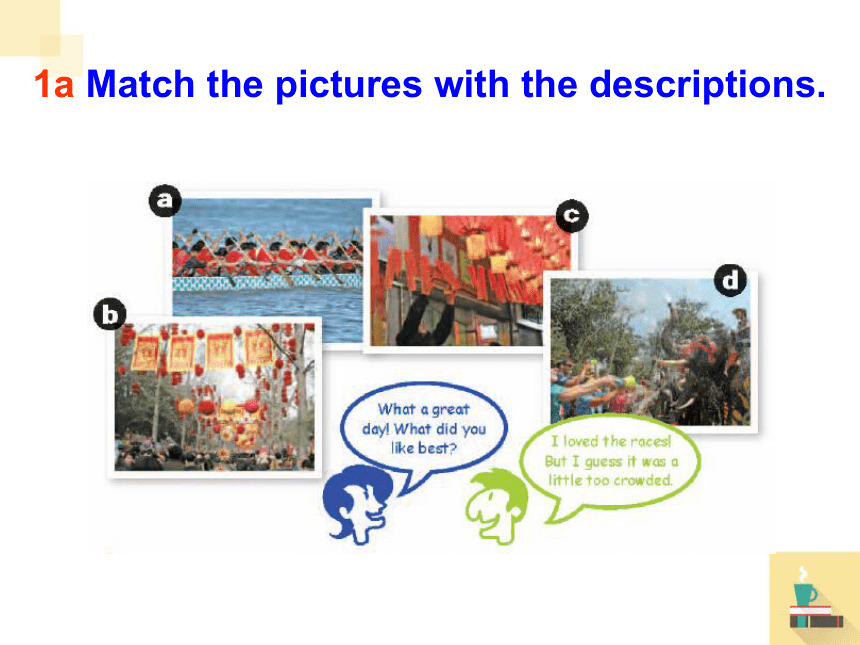
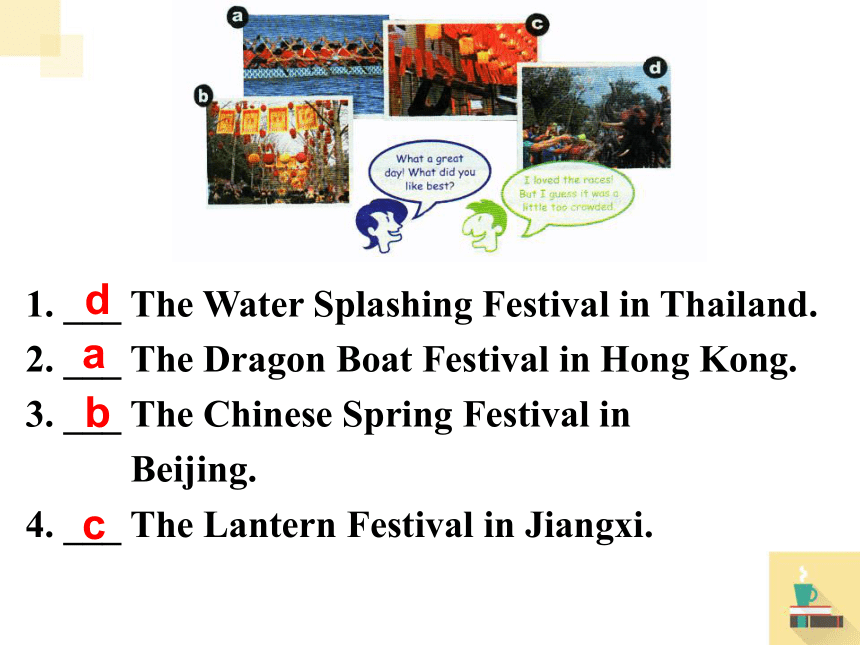
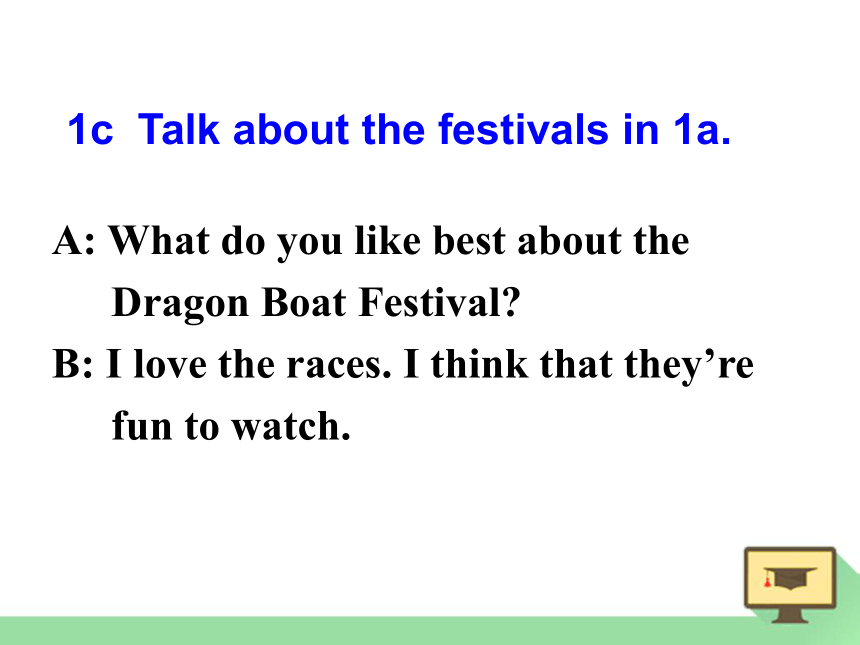
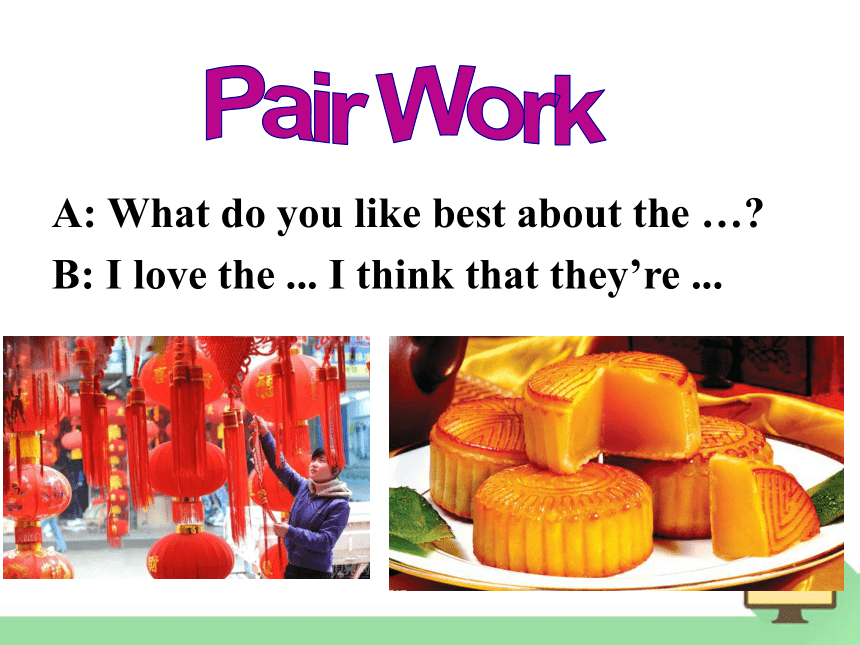
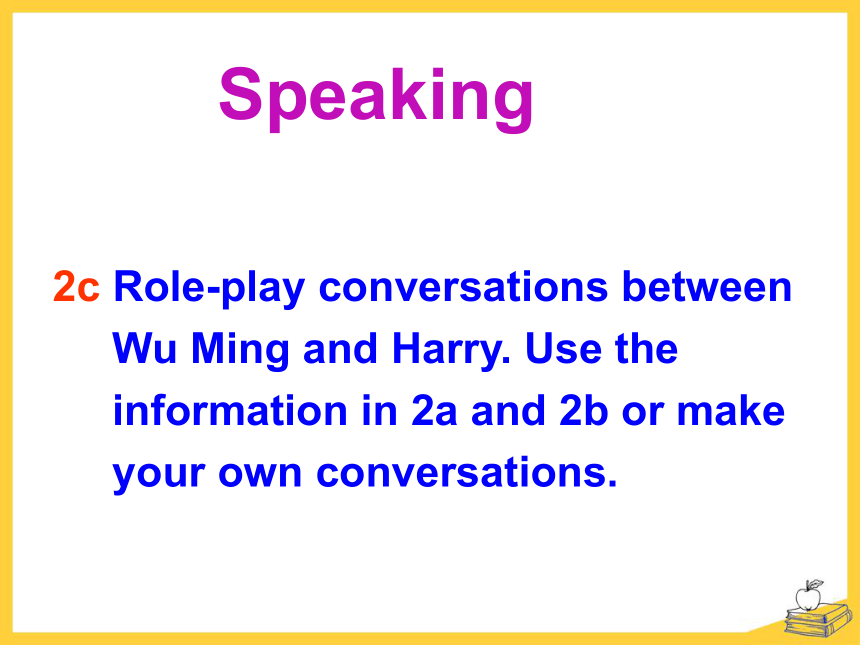
文档简介
(共29张PPT)
I think that mooncakes are delicious A!
What festival do you like best
What do you like best about your favourite festival
mooncake n. 月饼
Warming up
Lantern Festival 元宵节
lantern n. 灯笼 (可数名词)
Look at the pictures. Guess what festivals they are.
1a Match the pictures with the descriptions.
1. ___ The Water Splashing Festival in Thailand.
2. ___ The Dragon Boat Festival in Hong Kong.
3. ___ The Chinese Spring Festival in
Beijing.
4. ___ The Lantern Festival in Jiangxi.
d
a
b
c
1c Talk about the festivals in 1a.
A: What do you like best about the Dragon Boat Festival
B: I love the races. I think that they’re fun to watch.
A: What do you like best about the …
B: I love the ... I think that they’re ...
Pair Work
2c Role-play conversations between Wu Ming and Harry. Use the information in 2a and 2b or make your own conversations.
Speaking
A: What did you do on your vacation
B: I visited my cousins. I think that we ate five meals a day! I’ve put on five pounds.
A: I guess the food was delicious, right
1. Ben is going to Chiang Mai in two weeks. ( )
2. Clara believes that April is the hottest month of the year there. ( )
3. The Water Festival in Thailand is from April 13th to 15th. ( )
4. The Thai New Year is a time for cleaning and washing bad things. ( )
F
F
T
T
Read the conversation and tell “True” or False”.
1. stranger n. 陌生人(可数名词)
strange adj. 陌生的,奇怪的
e.g. Don’t talk to strangers.
不要和陌生人说话。
There is nothing strange in the room.
房间里没有奇怪的东西。
2. relative n. 亲属,亲戚 (可数名词)
e.g. They have a lot of relatives.
他们有许多亲戚。
Language points
3. put on 增加(体重);发胖;穿上
e.g. They’ve put on five pounds.
他们体重增加了5磅。
It’s cold outside. Please put on your
coat. 外面冷,请穿上大衣。
4. pound n. 磅;英镑(可数名词)
e.g. The desk weighs 5 pounds.
这张课桌重5磅。
5. People go on the streets to throw water at each other.
throw at 抛向;泼向;洒向
动词throw后接所投掷的物体,用介词at引入泼洒的对象。
e.g. On our way here, someone threw a
stone at our car, but fortunately we
were not hit.
在我们来的路上,有人向我们的车
投掷石块,所幸的是我们没被砸中。
It’s the first snow of the year, and
the children are happily throwing
snowballs at each other.
这是今年的第一场雪,孩子们高兴地拿雪球相互抛着。
The Water Splashing Festival
The Dragon Boat Festival
The Chinese Spring Festival
The Lantern Festival
watch the races
a little
like… best
go…for one’s vacation
enjoy doing sth.
eat out
泼水节
龙舟节
春节
元宵节
看比赛
有点
最……喜欢
去……度假
喜欢做某事
在外面吃
five meals a day
put on
in two weeks
sound like…
from…to…
be similar to…
throw … at …
wash away
have good luck
in the new year
每天5顿饭
增加(体重)
在两周之后
听起来像……
从……到……
与……相似
朝……扔……
洗掉
有好运气
在新的一年里
Sentences:
Bill thinks that the races were not that interesting to watch.
比尔认为那些比赛看起来不那么有趣。
Bill wonders whether they’ll have Zongzi again next year.
比尔想知道他们明年是否还有粽子吃。
What do you like best about the Dragon Boat Festival
端午节你最喜欢什么?
What did you do on your vacation
你假期干什么了?
But I believe that April is the hottest month of the year there.
但我相信四月是那儿最热的月份。
I wonder if it’s similar to the Water Festival of Dai people in Yunnan Province.
我想知道它是否与云南省傣族的泼水节相似。
宾语从句:
概念:在复合句中,由一个句子充当宾语,这个句子叫做宾语从句。
宾语从句由“关联词+主语+谓语”构成。
引导宾语从句的关联词有that, if, whether, what, who, where, why和how等。
Grammar
从句原形 关联词 例句
陈述句 that(在口语或非正式文体中常省略) I think (that) Halloween is a fun festival.
Mary thinks (that) the teams were just fantastic.
Many people think (that) sharks are too strong to be endangered.
一般疑问句 whether, if(在口语中 常用if) I wonder if/whether they’ll have the races again next year.
Ben wonders if/whether April is a good time to visit Thailand.
特殊疑问句 who, what, which, when, where, how, why Could you please tell me where the restrooms are
Do you know when the bookstore closes today
I asked Candy how life was different after she became famous.
Can you tell me who she is
总结一下吧!宾语从句的三要素:
一、关联词:that, if, whether, what, who,
where, why和how等。
二、时态:当主句用一般过去时时态时,
宾语从句要用过去的某种时态。
三、语序:宾语从句用陈述句语序,即
“主语+谓语”。
e.g. He asked me where my school was.
I didn’t know who she was.
1. ( ) —Do you know ____ Jane visits her
grandparents
—Once a week.
A. how soon B. how often
C. how long D. how far
2. ( ) —I want to know ____.
—Sorry. I’ve no idea. But she was
here just now.
A. where is Ann B. where Ann is
C. where was Ann D. where Ann was
B
B
Exercises
3. ( ) —Hi, Bruce. Here is a letter for you.
—Thanks. I wonder ____.
A. who the letter was from
B. who was from the letter
C. who was the letter from
D. who from the letter was
4. ( ) —Do you know _____
—He is a dentist.
A. where he is from B. where is he from
C. what does his father do
D. what his father is
A
D
5. ( ) Could you tell me _____ the cool T-
shirt
A. where you buy B. where do you buy
C. where did you buy
D. where you bought
6. ( ) Please tell me _____ to improve my
English.
A. how I can do B. what can I do
C. what I can do D. how can I do
D
C
根据所给汉语填空
1. Can you see the _________ (灯笼) over there How beautiful they are!
2. Parents often tell their children not to speak to _________ (陌生人).
3. I got a lot of gifts from my _________
(亲戚) on my birthday.
4. Don’t eat too much, or you’ll _______
(增加) your weight.
5. The car cost him 2000 _______ (英镑).
lanterns
strangers
relatives
put on
pounds
1. Learn the new words and expressions by heart.
2. Copy the sentences with the Objective Clause and learn them by heart.
Homework
I think that mooncakes are delicious A!
What festival do you like best
What do you like best about your favourite festival
mooncake n. 月饼
Warming up
Lantern Festival 元宵节
lantern n. 灯笼 (可数名词)
Look at the pictures. Guess what festivals they are.
1a Match the pictures with the descriptions.
1. ___ The Water Splashing Festival in Thailand.
2. ___ The Dragon Boat Festival in Hong Kong.
3. ___ The Chinese Spring Festival in
Beijing.
4. ___ The Lantern Festival in Jiangxi.
d
a
b
c
1c Talk about the festivals in 1a.
A: What do you like best about the Dragon Boat Festival
B: I love the races. I think that they’re fun to watch.
A: What do you like best about the …
B: I love the ... I think that they’re ...
Pair Work
2c Role-play conversations between Wu Ming and Harry. Use the information in 2a and 2b or make your own conversations.
Speaking
A: What did you do on your vacation
B: I visited my cousins. I think that we ate five meals a day! I’ve put on five pounds.
A: I guess the food was delicious, right
1. Ben is going to Chiang Mai in two weeks. ( )
2. Clara believes that April is the hottest month of the year there. ( )
3. The Water Festival in Thailand is from April 13th to 15th. ( )
4. The Thai New Year is a time for cleaning and washing bad things. ( )
F
F
T
T
Read the conversation and tell “True” or False”.
1. stranger n. 陌生人(可数名词)
strange adj. 陌生的,奇怪的
e.g. Don’t talk to strangers.
不要和陌生人说话。
There is nothing strange in the room.
房间里没有奇怪的东西。
2. relative n. 亲属,亲戚 (可数名词)
e.g. They have a lot of relatives.
他们有许多亲戚。
Language points
3. put on 增加(体重);发胖;穿上
e.g. They’ve put on five pounds.
他们体重增加了5磅。
It’s cold outside. Please put on your
coat. 外面冷,请穿上大衣。
4. pound n. 磅;英镑(可数名词)
e.g. The desk weighs 5 pounds.
这张课桌重5磅。
5. People go on the streets to throw water at each other.
throw at 抛向;泼向;洒向
动词throw后接所投掷的物体,用介词at引入泼洒的对象。
e.g. On our way here, someone threw a
stone at our car, but fortunately we
were not hit.
在我们来的路上,有人向我们的车
投掷石块,所幸的是我们没被砸中。
It’s the first snow of the year, and
the children are happily throwing
snowballs at each other.
这是今年的第一场雪,孩子们高兴地拿雪球相互抛着。
The Water Splashing Festival
The Dragon Boat Festival
The Chinese Spring Festival
The Lantern Festival
watch the races
a little
like… best
go…for one’s vacation
enjoy doing sth.
eat out
泼水节
龙舟节
春节
元宵节
看比赛
有点
最……喜欢
去……度假
喜欢做某事
在外面吃
five meals a day
put on
in two weeks
sound like…
from…to…
be similar to…
throw … at …
wash away
have good luck
in the new year
每天5顿饭
增加(体重)
在两周之后
听起来像……
从……到……
与……相似
朝……扔……
洗掉
有好运气
在新的一年里
Sentences:
Bill thinks that the races were not that interesting to watch.
比尔认为那些比赛看起来不那么有趣。
Bill wonders whether they’ll have Zongzi again next year.
比尔想知道他们明年是否还有粽子吃。
What do you like best about the Dragon Boat Festival
端午节你最喜欢什么?
What did you do on your vacation
你假期干什么了?
But I believe that April is the hottest month of the year there.
但我相信四月是那儿最热的月份。
I wonder if it’s similar to the Water Festival of Dai people in Yunnan Province.
我想知道它是否与云南省傣族的泼水节相似。
宾语从句:
概念:在复合句中,由一个句子充当宾语,这个句子叫做宾语从句。
宾语从句由“关联词+主语+谓语”构成。
引导宾语从句的关联词有that, if, whether, what, who, where, why和how等。
Grammar
从句原形 关联词 例句
陈述句 that(在口语或非正式文体中常省略) I think (that) Halloween is a fun festival.
Mary thinks (that) the teams were just fantastic.
Many people think (that) sharks are too strong to be endangered.
一般疑问句 whether, if(在口语中 常用if) I wonder if/whether they’ll have the races again next year.
Ben wonders if/whether April is a good time to visit Thailand.
特殊疑问句 who, what, which, when, where, how, why Could you please tell me where the restrooms are
Do you know when the bookstore closes today
I asked Candy how life was different after she became famous.
Can you tell me who she is
总结一下吧!宾语从句的三要素:
一、关联词:that, if, whether, what, who,
where, why和how等。
二、时态:当主句用一般过去时时态时,
宾语从句要用过去的某种时态。
三、语序:宾语从句用陈述句语序,即
“主语+谓语”。
e.g. He asked me where my school was.
I didn’t know who she was.
1. ( ) —Do you know ____ Jane visits her
grandparents
—Once a week.
A. how soon B. how often
C. how long D. how far
2. ( ) —I want to know ____.
—Sorry. I’ve no idea. But she was
here just now.
A. where is Ann B. where Ann is
C. where was Ann D. where Ann was
B
B
Exercises
3. ( ) —Hi, Bruce. Here is a letter for you.
—Thanks. I wonder ____.
A. who the letter was from
B. who was from the letter
C. who was the letter from
D. who from the letter was
4. ( ) —Do you know _____
—He is a dentist.
A. where he is from B. where is he from
C. what does his father do
D. what his father is
A
D
5. ( ) Could you tell me _____ the cool T-
shirt
A. where you buy B. where do you buy
C. where did you buy
D. where you bought
6. ( ) Please tell me _____ to improve my
English.
A. how I can do B. what can I do
C. what I can do D. how can I do
D
C
根据所给汉语填空
1. Can you see the _________ (灯笼) over there How beautiful they are!
2. Parents often tell their children not to speak to _________ (陌生人).
3. I got a lot of gifts from my _________
(亲戚) on my birthday.
4. Don’t eat too much, or you’ll _______
(增加) your weight.
5. The car cost him 2000 _______ (英镑).
lanterns
strangers
relatives
put on
pounds
1. Learn the new words and expressions by heart.
2. Copy the sentences with the Objective Clause and learn them by heart.
Homework
同课章节目录
- Unit 1 How can we become good learners.
- Section A
- Section B
- Unit 2 I think that mooncakes are delicious!
- Section A
- Section B
- Unit 3 Could you please tell me where the restroom
- Section A
- Section B
- Unit 4 I used to be afraid of the dark.
- Section A
- Section B
- Unit 5 What are the shirts made of?
- Section A
- Section B
- Review of Units 1-5
- Unit 6 When was it invented?
- Section A
- Section B
- Unit 7 Teenagers should be allowed to choose their
- Section A
- Section B
- Unit 8 It must belong to Carla.
- Section A
- Section B
- Unit 9 I like music that I can dance to.
- Section A
- Section B
- Unit 10 You're supposed to shake hands.
- Section A
- Section B
- Review of Units 6-10
- Unit 11 Sad movies make me cry.
- Section A
- Section B
- Unit 12 Life is full of the unexpected
- Section A
- Section B
- Unit 13 We're trying to save the earth!
- Section A
- Section B
- Unit 14 I remember meeting all of you in Grade 7.
- Section A
- Section B
- Review of Units 11-14
